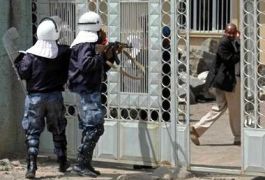193 killed by Ethiopia’s police during last year unrest
Oct 23, 2006 (NAIROBI) — At least 193 people, triple the official toll, were killed by Ethiopian police during post-election violence last year, according to the ex-vice chair of a parliamentary inquiry into the unrest.
 Wolde-Michael Meshesha, a judge who is now hiding in exile after allegedly receiving death threats, said the victims were killed in what amounted to a ‘massacre’ in two explosions of violence after the disputed May 2005 polls.
Wolde-Michael Meshesha, a judge who is now hiding in exile after allegedly receiving death threats, said the victims were killed in what amounted to a ‘massacre’ in two explosions of violence after the disputed May 2005 polls.
“Our findings showed that 193 innocent civilians were killed by the security forces, most of them shot by gun, others beaten with stones, sticks or other material,” he said at the weekend from an undisclosed location in Europe.
“Most of the civilians killed were young people, around 40 were under 20, the police shot indiscriminantly, 763 were injured, so we concluded that excessive force had been used by the security forces,” Wolde-Michael said.
“According to our findings, this is a kind of massacre, the people were killed without any reason, they shot … randomly, some people were in their houses when they were killed,” he said.
“The government violated the (people’s) human rights,” Wolde-Michael said, accusing Addis Ababa of trying to cover up the findings of the report, which was to have been released earlier this year but was delayed.
The figures compiled by the commission are three times higher than the government’s official death toll of 54 from the violence in Addis Ababa and other cities that erupted in June and November amid protests over the polls.
At the time, hospital workers, relatives and other sources gave a slightly higher toll of 84, but the government has repeatedly insisted that figure is an exaggeration.
Ethiopian Prime Minister Meles Zenawi has expressed regret for the deaths but has laid the blame for the unrest on the main opposition Coalition for Unity and Democracy (CUD) that authorities accuse of trying to foment a coup.
Nearly the entire CUD leadership is currently on trial on charges ranging from treason to genocide and conspiracy for calling for nationwide protests against the results of the May 15 elections that they say were rigged.
Wolde-Michael said that after the panel had finished its work, he and other members — eight out of 10 of whom agreed with the findings — were pressured by Meles to change the results.
“After we concluded our investigation, the prime minister asked us to reverse our findings …” but we had collected evidence, we interrogated victims, associations, officials, prisoners, collected hospital reports.
“The results were tangible, so how could we reverse the results of the investigation?’ he asked, adding he had been warned ‘if your decision is not reversed, the country will be in danger and also your life.”
In Addis Ababa, a government official, who spoke on condition of anonymity, declined to comment on the substance of Wolde-Michael’s allegations but the administration would soon address the matter at a news conference.
“We don’t want to comment on this issue for the moment,’ the official said. ‘We are aware that some people have made some declarations to the press but it is the parliament who has the mandate to deal with this issue.”
The new chief of the inquiry commission, Mekonnen Disasa, pledged that a report on the violence would be released.
“This is a report that has been commissioned by the parliament and the report will be submitted directly to parliament,” he said, without giving a timetable.
Polling day conduct during Ethiopia’s 2005 elections, the country’s third free polls since the 1991 ouster of a Soviet-backed dictatorship, was widely lauded by international observers.
However, the opposition quickly accused Meles’ ruling Ethiopian People’s Revolutionary Democratic Front (EPRDF) of major improprieties in vote counting and alleged widespread fraud in the aftermath.
In its final report on the election the European Union said the polls had fallen well-short of international standards, particularly in the handling of complaints that led to protests and then the deadly violence.
The chief EU observer for the polls, Ana Gomes, who was excoriated by the government for critical comments about the election, said the Wolde-Michael report on the unrest was a damning indictment of the administration.
“This regime is neither democratic nor responsible,’ she told AFP. ‘It is a repressive regime that does not hestitate to kill its citizens or imprison them without due legal process.”
“I urge that the report be made public… and that sanctions be taken against this regime,” Gomes said, calling for travel bans and asset freezes for Meles and senior government officials.
(AFP)
